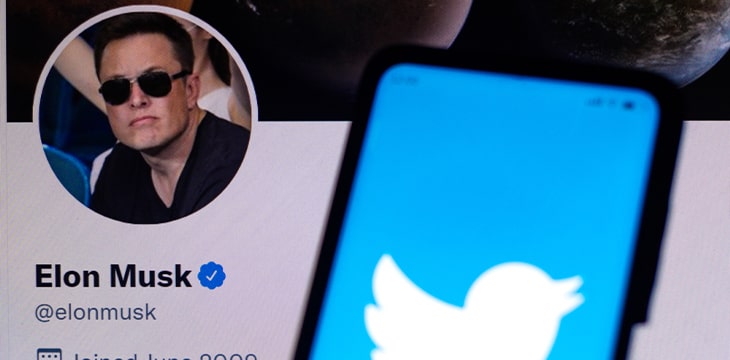|
Getting your Trinity Audio player ready...
|
Twitter is currently experiencing a “fall of the Berlin Wall” moment following billionaire Elon Musk’s successful takeover of the company. Musk, a “free speech absolutist,” has promised to restore open discussion on the social network and lock Twitter’s source code to prevent employee tampering.
🚀💫♥️ Yesss!!! ♥️💫🚀 pic.twitter.com/0T9HzUHuh6
— Elon Musk (@elonmusk) April 25, 2022
Just weeks after paying US$2.64 billion to become Twitter’s largest shareholder, Musk assembled a takeover offer for 100% of the company for $54.20 per share or around US$44 billion total. There was some initial hesitance from Twitter’s board and talks of deploying “poison pill” measures to prevent the buyout. However, pressure from shareholders and Musk fans proved too great, and the board unanimously approved the offer last night. The board’s approval means all publicly traded shares will automatically be sold to Musk at the price offered.
Following the takeover, Twitter will become a privately-owned company again, and its shares will not be publicly traded. This means Twitter will no longer be subject to the same reporting requirements and shareholder activism that have changed its nature since its initial public offering (IPO) in 2013.
Musk takeover news prompts instant change
Thousands of previously banned users celebrated the news by flooding back to the platform, making thousands of previously banned statements. However, most are in the form of newly created accounts rather than reinstated ones. Although some are genuine, there are also several scams and honeypot accounts waiting to trap enthusiastic followers.
Most of those removed from Twitter in the past five years fall on the conservative/right side of the political spectrum. And some negative responses from progressive/liberal voices on Twitter and mainstream media lend credence to this claim, with many popular accounts and Twitter employees threatening to quit once Musk takes over.
It’s too early to say whether Twitter can rediscover its glory days as a free-for-all open discussion platform.
Censorship on Twitter (and other social networks) had reached a crescendo following the 2016 election of Donald Trump to the U.S. presidency. Initial removals represented those with more “extreme” political stances, as well as popular media figures with opinions considered too outre, such as Milo Yiannopoulos and Alex Jones. As the years went on, however, the ban-hammer also fell on thousands of ordinary users who merely expressed views considered outside the window of mainstream acceptability or who had countered official media narratives on topics like the COVID-19 pandemic, election fairness, and gender issues.
Under the reign of previous CEO and original founder Jack Dorsey, there was also censorship surrounding blockchain and digital asset discussions. Dorsey, who claims to be a free speech supporter himself, is also a BTC maximalist. His leadership oversaw the removal of accounts, including Bitcoin creator Dr. Craig S. Wright, and many BSV supporters claimed their accounts had been “shadowbanned.”
Following Dorsey’s departure in November 2021, there was a notable shift in blockchain-related conversation. Dr. Wright returned to Twitter, though under a new account name rather than his banned one, and he has pledged to use the account for announcements and official statements rather than his more free-form and stream-of-consciousness posts of the past.
Can Twitter recapture its old free spirit?
Donald Trump, himself was banned from Twitter in 2021 while he was still the sitting President, reportedly responded to the news by wishing Musk well but added that he wouldn’t be returning. Trump has recently attempted to launch his own “free speech social network,” called Truth Social.
Truth Social and other Twitter alternatives, such as Gab, Gettr, and Parler, received some buzz as havens for social media accounts banned from other networks. However, they have faced their own accusations of censorship and bans from popular app stores, as well as criticisms from both supporters and detractors for their tendency to become mono-cultures restricted to narrow topic ranges.
Free, fast speech made Twitter wildly popular over the past decade, and its network effect meant there were discussion topics to suit all tastes and interests. However, it also struggled to make a profit from its advertising model, and its share price has slumped from previous highs, factors that likely made Musk’s generous takeover offer more appealing.
Twetch, which uses the BSV blockchain for storing posts and micropayments for usage, has been popular with BSV fans and NFT traders. The company demonstrated there is a new business model for social media if micropayments can function, as they do quite easily on BSV.
While some are excited about Twitter’s new ownership, like a teenager in their first car, others remain cautious. The network still faces heavy pressure from governments and the mainstream media (who see it as a threat to their narrative dominance), as well as social justice activists who had benefitted from having dissenting voices silenced. Musk has not stated what (if any) limits he will place on “free speech,” and it’s yet to be seen if one man—even if he’s the richest man in the world—actually has the power to shift the internet’s culture back to the way it was.
Watch: CoinGeek New York panel, A Better Internet Experience using Blockchain

 03-01-2026
03-01-2026 




